Key takeaways:
- National Reading Month in March promotes the joy of reading and literacy, encouraging activities that foster a love for literature across all ages.
- Agatha Christie, known as the “Queen of Crime,” has made a significant impact on the mystery genre with her intricate plots and memorable characters, influencing numerous authors and adaptations.
- Celebrating Agatha Christie can involve hosting reading marathons, screening modern adaptations of her works, and exploring her biography to gain deeper insights into her life and storytelling.
- Personal tributes to Christie can include creating themed book clubs, writing letters from her characters’ perspectives, and compiling scrapbooks of favorite quotes and memories associated with her stories.
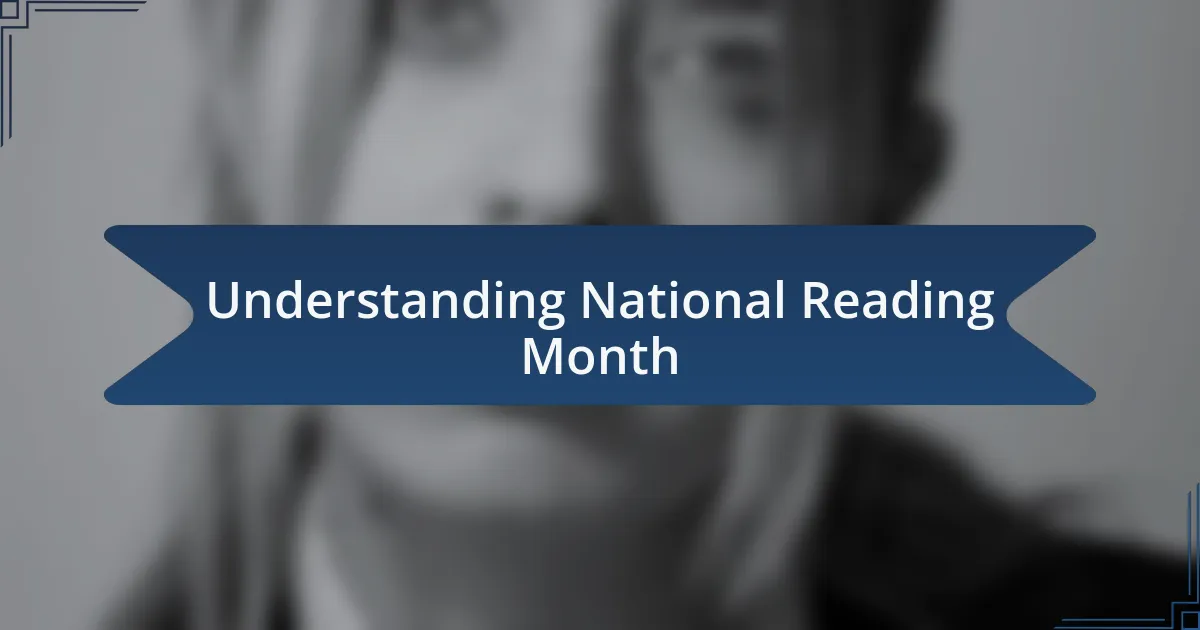
Understanding National Reading Month
National Reading Month is celebrated every March, serving as a dedicated time to promote the joy of reading among individuals of all ages. It’s fascinating to think about how a simple act like reading can transport us into different worlds, isn’t it? I remember the first time I picked up an Agatha Christie novel, feeling utterly captivated by the intricate plots and vivid characters.
The month encourages schools, libraries, and families to engage in activities that foster a love for literature. I vividly recall hosting a reading night with friends, where we shared our favorite passages. Seeing everyone’s eyes light up at shared moments from the stories was truly exhilarating, reinforcing the idea that reading isn’t just about words on a page; it’s about connection and discovery.
Moreover, National Reading Month sparks discussions about the importance of literacy in shaping our society. It raises questions like, how can we better inspire the next generation to read? From personal experience, I believe that introducing young readers to compelling authors, such as Agatha Christie, nurtures a lifelong love for books and enriches their imagination.
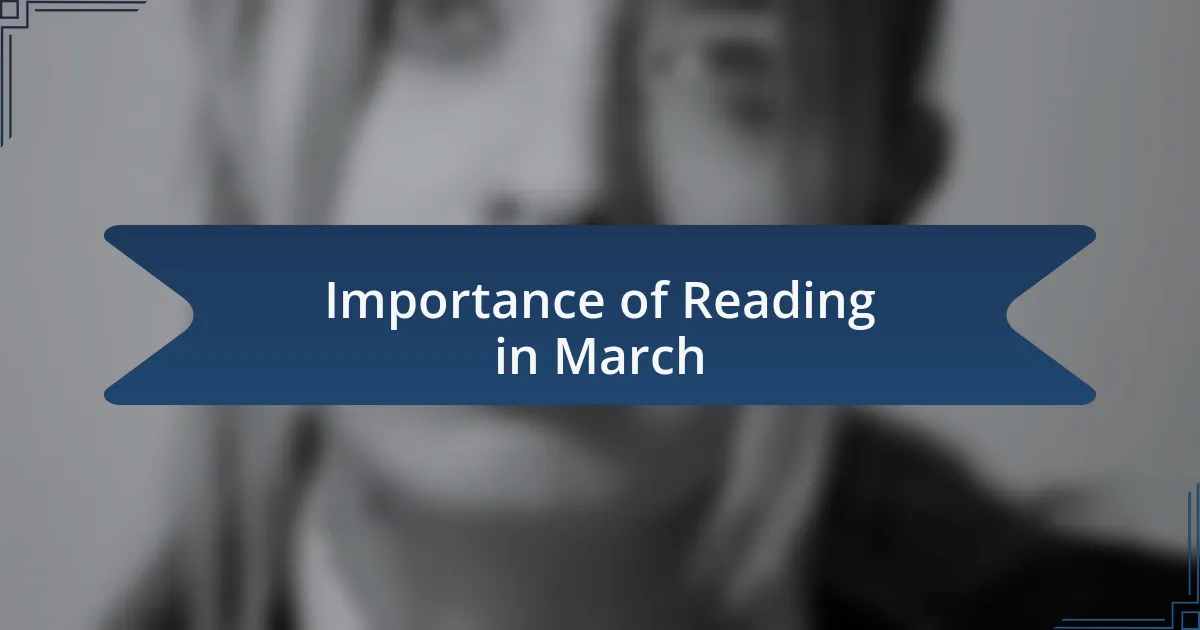
Importance of Reading in March
Reading in March holds a special significance as it aligns with a broader initiative to highlight the impact of books on our lives. I recall strolling through my local library during this time, feeling the excitement in the air as families gathered for reading events. It was heartwarming to see children curled up with their favorite stories, and it reminded me of my own formative experiences lost in the pages of a mystery thriller.
This month serves as a reminder of how reading empowers us and enhances our empathy. Can you imagine how many perspectives one can gain simply by diving into a different character’s world? I still reflect on the emotional rollercoaster I experienced while unraveling the twists and turns in Christie’s narratives, ever aware of how these tales expanded my understanding of human nature and relationships.
Additionally, promoting a love for reading in March helps to combat the distractions of modern technology. I often find myself torn between my phone and a good book, but during this month, I make a concerted effort to choose literature over screens. Just last year, I set a personal challenge to read at least one Agatha Christie novel each week in March, and it deepened my appreciation for her craft, reaffirming the idea that reading can profoundly influence our daily lives.
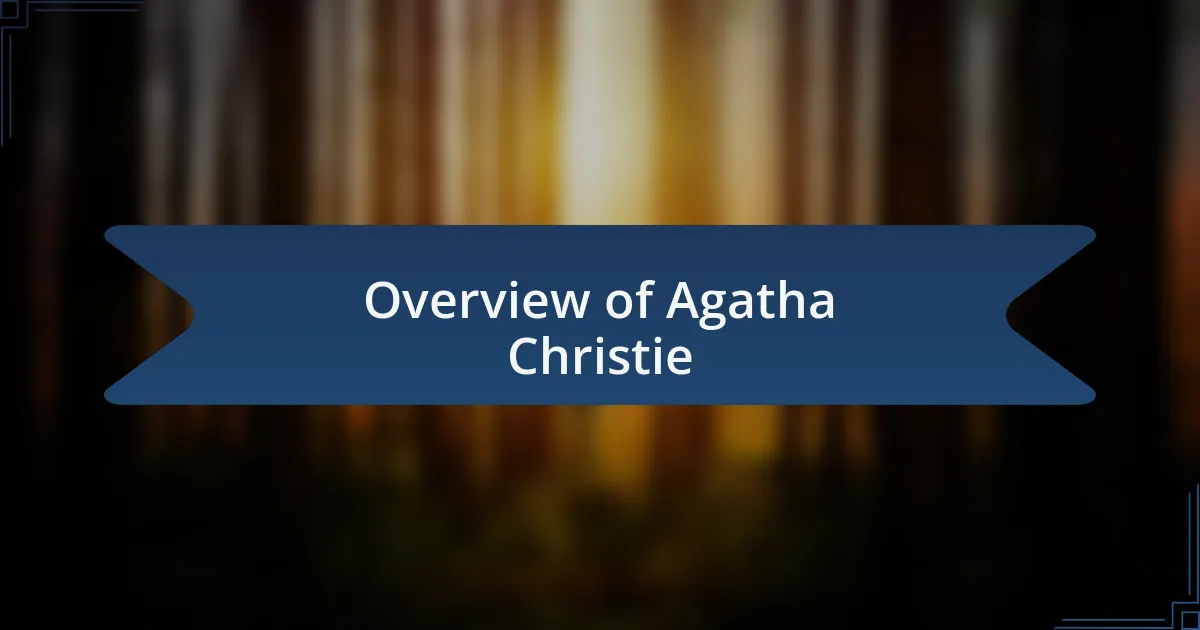
Overview of Agatha Christie
Agatha Christie, often regarded as the “Queen of Crime,” has captivated readers with her intricate plotting and unforgettable characters since the early 20th century. I remember the first time I was introduced to her work; it was through “Murder on the Orient Express,” and I was instantly enchanted by the clever twists and the brilliant detective, Hercule Poirot. Her ability to weave together suspense and unexpected revelations is what truly sets her apart in the literary world.
Throughout her prolific career, Christie penned over 70 novels, each one a unique puzzle waiting to be solved. It’s fascinating to think about how she mastered the art of misdirection, leaving readers on the edge of their seats. Reflecting on my reading experiences, I’ve often found myself turning back pages to decipher clues I had missed, realizing just how skillfully she brought her stories to life. Does anyone else experience that delightful frustration of piecing together the mystery as you read?
Christie’s impact on the mystery genre is undeniable, influencing countless authors and adaptations in various media. I often contemplate what it is about her storytelling that continues to resonate with readers today. Perhaps it’s her deep understanding of human nature—she portrays both the light and dark aspects of personality with such nuance. Just last week, as I revisited “And Then There Were None,” I was struck by how much more I appreciated the layers of her characters and the moral dilemmas they faced. This depth adds an enriching layer to her work that keeps me coming back for more.
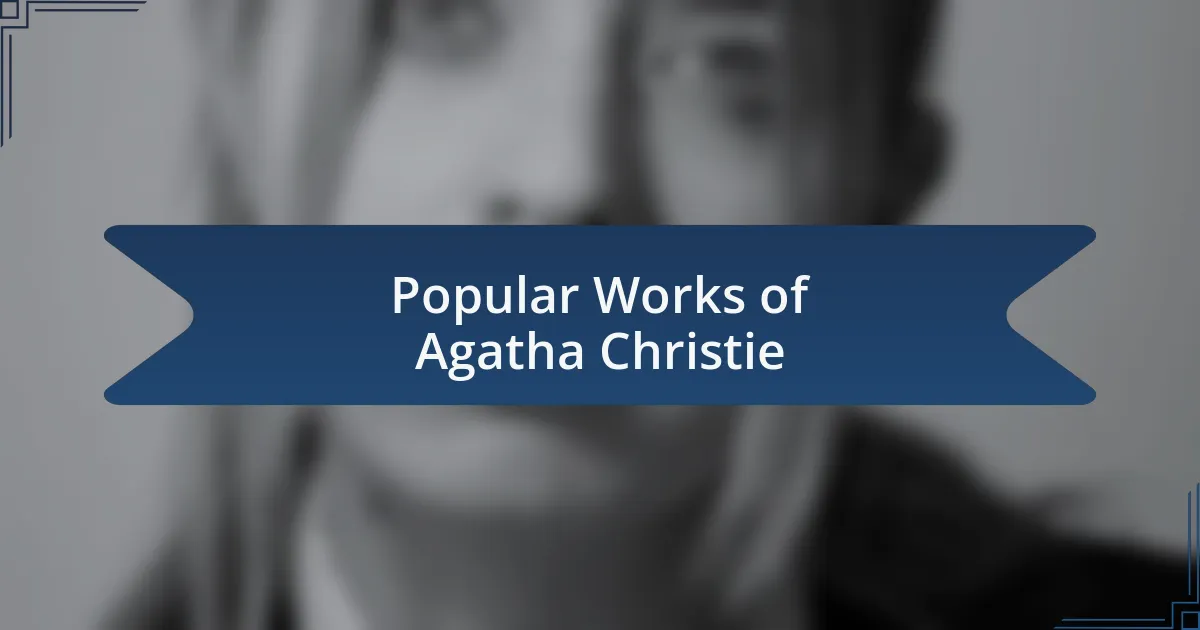
Popular Works of Agatha Christie
One of Agatha Christie’s most enduring works is “The Murder of Roger Ackroyd,” which has captivated readers with its audacious twist. I still recall the moment I put the book down, utterly shocked by how she subverted my expectations. The narrative is a masterclass in unreliable storytelling, prompting me to wonder how often we trust the wrong character in a story.
Another standout is “Death on the Nile,” where Christie takes us on a luxurious journey filled with deceit and betrayal. I remember the vivid imagery of the Nile River and how it heightened the tension. The layers of motive among the characters are so complex that it had me analyzing each person’s actions long after I turned the last page. Don’t you think that kind of lingering mystery is what makes her work so compelling?
Lastly, we can’t overlook “And Then There Were None,” often regarded as her crowning achievement. This novel’s isolation and paranoia struck a chord with me—every character’s fate felt palpable and real. Reflecting on the way the story unfolds, I find myself asking how closely I would pay attention to my surroundings in such a dire situation. It’s experiences like these that highlight Christie’s unparalleled ability to immerse us in her world of suspense.
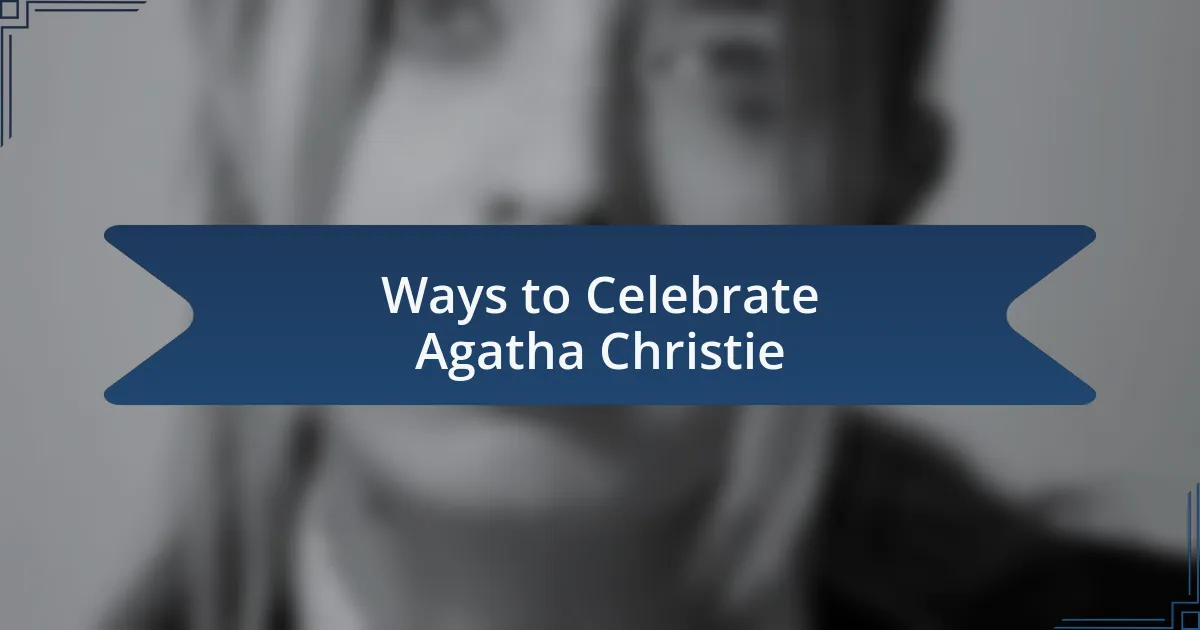
Ways to Celebrate Agatha Christie
One delightful way to celebrate Agatha Christie is to host a dedicated reading marathon featuring her most iconic novels. I remember one rainy afternoon when I invited friends over for a Christie-themed gathering. As we delved into “Murder on the Orient Express,” I felt a palpable buzz of excitement as we discussed the unfolding plot twists and our theories about the killer. Wouldn’t it be fun to see how others interpret the same clues?
Another engaging approach is to organize a modern adaptation screening of her works. I recently watched a contemporary film version of “Murder on the Nile,” and it sparked a lively debate among my friends about how adaptations can reimagine elements of the original stories while maintaining their essence. How do you think different settings and casting choices affect our understanding of Christie’s characters?
Lastly, consider diving into the fascinating world of Agatha Christie’s life by exploring her extensive biography and less-known writings. I stumbled upon her autobiography and was surprised by the depth of her experiences, from her travels to her personal struggles. It led me to appreciate not just her stories, but the woman behind them. What insights do you think might change our perception of her work when we understand her journey?

Personal Tribute Ideas for Christie
One personal tribute idea is to create a themed book club focusing solely on Christie’s works. I still remember the thrill of discussing “And Then There Were None” during such a group. Each member brought a unique perspective, and our conversations often crossed into territory I hadn’t considered before. Have you ever found that a different viewpoint can completely change your understanding of a story?
Another heartfelt way to honor Christie is by writing a letter to her as if you were a character in one of her novels. I tried this once, crafting a message from the perspective of Poirot, expressing admiration for her intricate plotting. It felt incredibly personal, as if I was engaging in a dialogue across time and space. How do you think she would respond to the thoughts and feelings of her characters?
Lastly, consider creating a scrapbook that combines your favorite quotes, moments, and memories associated with her stories. I put together one filled with imagery from film adaptations and passages that moved me. Flipping through it reignites my passion for her work every time. What memories or quotes would you include to capture the essence of how Christie has influenced your own reading journey?